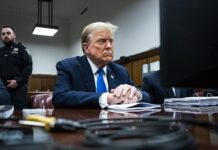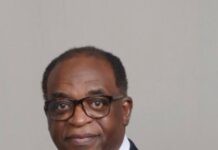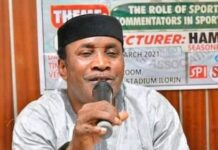 Interestingly, many of those that have condemned the Odi massacre, including President Goodluck Jonathan – remember the embarrassing altercation last year between him and former president, General Olusegun Obasanjo, over the massacre? – and supported the granting of amnesty for the Delta region’s militants are the same people that have since been advocating the use of the same force, indeed an even more brutal one than that used in Odi, as the only solution to Boko Haram.
Interestingly, many of those that have condemned the Odi massacre, including President Goodluck Jonathan – remember the embarrassing altercation last year between him and former president, General Olusegun Obasanjo, over the massacre? – and supported the granting of amnesty for the Delta region’s militants are the same people that have since been advocating the use of the same force, indeed an even more brutal one than that used in Odi, as the only solution to Boko Haram.
For example, The Punch (March 14) which has consistently condemned dialogue with the sect called the amnesty “outrageous” and “gravely precarious.” Yet as recently as January 15 it had praised amnesty for the Delta militants as a “panacea for peace in the hitherto restive oil-rich Niger Delta…” even though, in fairness, it also expressed some concern over the seemingly open-ended approach to the amnesty.
The Nigerian Tribune, which also opposed any form of dialogue with for Boko Haram in its editorial of July 13, 2011, had apparently forgotten its editorial of February 8, 2011 wherein it said “Soldiers and other security agents, even if they are professionally neutral, cannot bring lasting peace to Plateau State. The people of the state must begin an honest search for peace.”
Similarly the Nobel Literature Laureate, Professor Wole Soyinka has been vehemently opposed to dialogue with Boko Haram. Yet back in 2001 at the height of the clashes between the security forces and the Odua Peoples’ Congress, he petitioned President Obasanjo to condemn what he said were the human right abuses of OPC members and called for dialogue between the organisation and the authorities.
In the light of his high reputation as a champion of human rights, let me crave the indulgence of the reader to quote his petition extensively.
“What,” he said in that petition, “has become apparent and undeniable is a systematic project of decimating this organisation through acts of intimidation, brutalisation and extra-judicial killings. We cannot stand by and watch these murders continue, openly or in secret. The goals are filled with alleged members of the OPC. We have evidence of their routine ill treatment, and the resolve of the police to continue in their conduct, in full impunity. Much of these atrocities constitute punishable crimes in any decent society. They are being catalogued, and will be answered some day, unless restraint is exercised and the agents of excess called to strict order, and urgently.
“No one advocates violence. State violence is no less reprehensible than the sporadic violence of extreme civil movements in society. An organisation is not condemned by the actions of infiltrators, agent provocateurs, and even the authentic lunatic fringe within a movement.
“There is law in this nation – at least, we are persuaded that we now live in a society organised around the principle of legality. The police are not above the law. The police are certainly not licensed as killers in society. We insist: THESE KILLINGS BY STATE AGENCIES MUST STOP…
“It is time that the OPC be called to dialogue in whatever states they exist, but most especially in Lagos state… If the path of dialogue is rejected and the current project of piecemeal pogrom is pursued, let it be understood that full responsibility lies in the hands of this government and its security agencies.”
At the time of Professor Soyinka’s petition, OPC had clashed violently not only with the police. It had also done so with just about every major ethnic group resident in Yorubaland, all in the name of protecting Yoruba interests. Tell newsmagazine, in its edition of October 30, 2000, accurately captured the organization’s reputation for violence in its cover story of the four days of mindless killing, maiming and destruction OPC unleashed on Lagos residents from October 15, mostly against so-called Hausa. In a sidebar to the story, the newsmagazine catalogued the organization’s bloody attacks between July 16, 1999 and October 15, 2000 under the caption “(OPC’s) Trail of Blood.” The description couldn’t have been more apt; the bloody trail included attacks on the Ijaw Egbesu Boys in Ajegunle, Hausas in Shagamu, Ajegunle and Mushin, Igbo traders at Alaba market and even a clash between the Gani Adams and Dr Frederick Fasehun factions of the organization in Mushin.
The difference, they say, is that Boko Haram, unlike OPC or the Movement for the Emancipation of Niger Delta (MEND), is faceless and its goals and demands are irrational. The simple answer to the first excuse is, if Boko Haram seems faceless – and it is not, because the authorities very well know and have occasionally been in contact with several of its leaders, including Imam Abubakar Shekau – it is because it seemed politically convenient for government not to put any face to the sect’s leadership. At least twice it was persuaded to dialogue with government and lay down its arms. Each time someone, obviously an insider, leaked the move to a select media before negotiations had even begun in an apparent attempt to scuttle the talks. Worse, the authorities arrested those the sect sent to begin the talks.
Whatever anyone may think is the difference between Boko Haram and MEND as a beneficiary of amnesty, the fact is that the militants did not come out from the creeks where they operated from until it was clear that late president, Umaru Yar’adua, was sincere in his commitment to bring an end to the problems of Niger Delta. So far such sincerity in seeking an end to the insurgency in the North has been lacking in President Jonathan’s government and in its security agencies.
As for the argument that the goals and demands of the sect are irrational, there is also the simple answer that however irrational, those goals and demands do not, and cannot, justify the terrible collective punishment the communities in which the sect’s suspected members live have been subjected to all these years. This is the lesson of Justice Lambo Akanbi’s judgment on Odi.
In any case, it is not all of the sect’s demands that are irrational. Its stated objective of Islamizing Nigeria through the barrel of the gun is certainly irrational if only because the Qur’an (2:256) itself categorically states “There is no compulsion in religion…” It also says in Chapter 3 Verse 20, “…So if they submit then indeed they follow the right way; and if they turn back, then upon you is only the delivery of the message and Allah sees the servants.” In other words, the word is persuasion not force.
Islamophobes, of course, love to quote Chapter 2 Verse 191 of the Qur’an which says “And kill them wherever you find them, and drive them out from whence they drove you out, and persecution is severer than slaughter…” as evidence that Islam is a violent religion. This is simply plain mischief – probably worse; mischief, because the quotation is taken completely out of the context of the verse before it and the two after.
Verse 190 of the chapter says “And fight in the way of Allah with those who fight with you and do not exceed the limits, surely Allah does not love those who exceed the limits.” Verses 192 and 193 respectively say “But if they desist, then surely Allah is Forgiving, Merciful” and “…Fight with them until there is no persecution, and religion should be only for Allah, but if they desist, then there should be no hostility except against the oppressors.”
Taken as a whole it is clear from these verses that the Qur’an is against aggression. It admonishes Muslims to fight only in self defence and even then never to exceed the limits. No sane person would disagree that bombing churches, schools, motor parks and media houses, killing and maiming innocent people, etc, as Boko Haram has done, is exceeding Allah’s limits even in self defence.
But other than Boko Haram’s untenable goal of Islamizing Nigeria by force, there is nothing irrational in most of its other demands, especially the demand that the security forces stop the abuse of their powers in carrying out their duties to secure peace, law and order in society. This is a demand that has been repeatedly made by Amnesty International and myriads of local human rights organisations, including CLO and CDHR, even as they have rightly condemned Boko Haram terror.
That the country is less secure and less peaceful today than it was four years ago when President Yar’adua ordered the military invasion of the Maiduguri stronghold of Boko Haram, is proof positive that the preference for the use of force by the authorities almost to the exclusion of other options is a triumph of wishful thinking over the experience of the last four years.
The big lesson of these four years of the failure to crush Boko Haram in spite the military occupation of its redoubts is that amnesty for its members has become a doctrine of necessity. On its own it may not guarantee peace, law and order in the country but without it we are not likely to see an end to the sect’s terror any time soon. Besides, it is not likely to cost the country the leg and arm that amnesty for the Niger Delta militants has cost this country – over 200 billion Naira so far, and counting.
Now that President Jonathan seems to have made his choice, albeit tentatively, between those like Bishop Kukah who support amnesty and those like Sheikh Gumi who oppose it, he will, hopefully, follow it through in good faith and refuse to be deterred by his more gung-ho security chiefs who have consistently failed to deliver on their boasts of crushing Boko Haram.



